
- •Understanding Why Communication Matters
- •Communicating as a Professional
- •Exploring the Communication Process
- •Committing to Ethical Communication
- •Communicating in a World of Diversity
- •Using Technology to Improve Business Communication
- •Chapter Review and Activities
- •Test Your Knowledge
- •Apply Your Knowledge
- •Practice Your Skills
- •Expand Your Skills
- •References
- •Understanding the Three-Step Writing Process
- •Analyzing the Situation
- •Gathering Information
- •Selecting the Right Medium
- •Organizing Your Message
- •Chapter Review and Activities
- •Test Your Knowledge
- •Apply Your Knowledge
- •Practice Your Skills
- •Expand Your Skills
- •References
- •Adapting to Your Audience: Building Strong Relationships
- •Adapting to Your Audience: Controlling Your Style and Tone
- •Composing Your Message: Choosing Powerful Words
- •Composing Your Message: Creating Effective Sentences
- •Composing Your Message: Crafting Coherent Paragraphs
- •Using Technology to Compose and Shape Your Messages
- •Chapter Review and Activities
- •Test Your Knowledge
- •Apply Your Knowledge
- •Practice Your Skills
- •Expand Your Skills
- •References
- •Revising Your Message: Evaluating the First Draft
- •Revising to Improve Readability
- •Editing for Clarity and Conciseness
- •Using Technology to Revise Your Message
- •Producing Your Message
- •Proofreading Your Message
- •Distributing Your Message
- •Chapter Review and Activities
- •Test Your Knowledge
- •Apply Your Knowledge
- •Practice Your Skills
- •Expand Your Skills
- •References
- •Electronic Media for Business Communication
- •Social Networks
- •Information and Media Sharing Sites
- •Instant Messaging and Text Messaging
- •Blogging
- •Podcasting
- •Chapter Review and Activities
- •Test Your Knowledge
- •Apply Your Knowledge
- •Practice Your Skills
- •Expand Your Skills
- •References
- •Strategy for Routine Requests
- •Common Examples of Routine Requests
- •Strategy for Routine Replies and Positive Messages
- •Common Examples of Routine Replies and Positive Messages
- •Chapter Review and Activities
- •Test Your Knowledge
- •Apply Your Knowledge
- •Practice Your Skills
- •Expand Your Skills
- •References
- •Using the Three-Step Writing Process for Negative Messages
- •Using the Direct Approach for Negative Messages
- •Using the Indirect Approach for Negative Messages
- •Sending Negative Messages on Routine Business Matters
- •Sending Negative Employment Messages
- •Sending Negative Organizational News
- •Responding to Negative Information in a Social Media Environment
- •Chapter Review and Activities
- •Test Your Knowledge
- •Apply Your Knowledge
- •Practice Your Skills
- •Expand Your Skills
- •References
- •Using the Three-Step Writing Process for Persuasive Messages
- •Developing Persuasive Business Messages
- •Common Examples of Persuasive Business Messages
- •Developing Marketing and Sales Messages
- •Chapter Review and Activities
- •Test Your Knowledge
- •Apply Your Knowledge
- •Practice Your Skills
- •Expand Your Skills
- •References
- •Applying the Three-Step Writing Process to Reports and Proposals
- •Supporting Your Messages with Reliable Information
- •Conducting Secondary Research
- •Conducting Primary Research
- •Planning Informational Reports
- •Planning Analytical Reports
- •Planning Proposals
- •Chapter Review and Activities
- •Test Your Knowledge
- •Apply Your Knowledge
- •Practice Your Skills
- •Expand Your Skills
- •References
- •Writing Reports and Proposals
- •Writing for Websites and Wikis
- •Illustrating Your Reports with Effective Visuals
- •Completing Reports and Proposals
- •Chapter Review and Activities
- •Test Your Knowledge
- •Apply Your Knowledge
- •Practice Your Skills
- •Expand Your Skills
- •References
- •Finding the Ideal Opportunity in Today’s Job Market
- •Planning Your Résumé
- •Writing Your Résumé
- •Completing Your Résumé
- •Chapter Review and Activities
- •Test Your Knowledge
- •Apply Your Knowledge
- •Practice Your Skills
- •Expand Your Skills
- •References
- •Submitting Your Résumé
- •Understanding the Interviewing Process
- •Preparing for a Job Interview
- •Interviewing for Success
- •Following Up After an Interview
- •Chapter Review and Activities
- •Test Your Knowledge
- •Apply Your Knowledge
- •Practice Your Skills
- •Expand Your Skills
- •References
- •Index
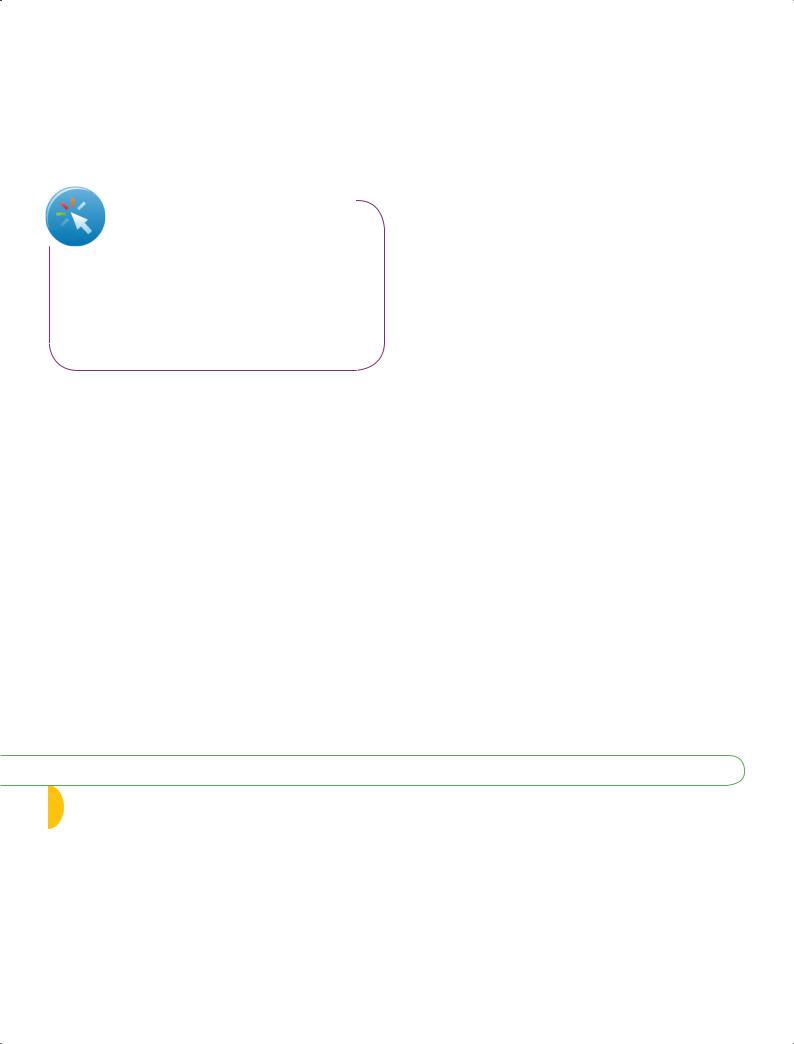
398 Unit 5: Employment Messages and Job Interviews
If you want to be taken seriously, |
■ |
For less formal environments, smart-looking “business casual,” including a pressed shirt |
|
dress and act seriously. |
|||
|
or blouse and nice slacks or a skirt. |
||
|
|
||
|
■ Limited jewelry (men, especially, should wear very little jewelry) |
||
|
■ |
No visible piercings other than one or two earrings (for women only) |
|
|
■ |
No visible tattoos |
|
|
■ |
Stylish but professional-looking shoes (no extreme high |
REAL-TIME UPDATES |
|
heels or casual shoes) |
Learn More by Visiting This Interactive Website |
■ |
Clean hands and nicely trimmed fingernails |
|
|
Prepare for your next interview with these Pinterest pins
■Little or no perfume or cologne (some people are allergic and many people are put off by strong smells)
■Subtle makeup (for women)
The Pinterest pinboard maintained by St. Edward’s University offers dozens of helpful resources. Go to http:// real-timeupdates.com/bce6 and click on Learn More. If you are using MyBCommLab, you can access Real-Time Updates within each chapter or under Student Study Tools.
■ Exemplary personal hygiene
An interview is not the place to express your individuality or to let your inner rebel run wild. Send a clear signal that you understand the business world and know how to adapt to it. You won’t be taken seriously otherwise.
Be ready to go the minute you arrive at the interviewing site; don’t fumble around for your résumé or your list of questions.
Being Ready When You Arrive
When you go to your interview, take a small notebook, a pen, a list of the questions you want to ask, several copies of your résumé (protected in a folder), an outline of what you have learned about the organization, and any past correspondence about the position. You may also want to take a small calendar, a transcript of your college grades, a list of references, and a portfolio containing samples of your work, performance reviews, and certificates of achievement.36 Think carefully if you plan to use a tablet computer or any other device for note taking or reference during an interview. You don’t want to waste any of the interviewer’s time fumbling with it. Also, turn off your mobile phone; in a recent survey of hiring professionals, answering calls or texting while in an interview was identified as the most common mistake job candidates make during their interviews.37
Be sure you know when and where the interview will be held. The worst way to start any interview is to be late. Verify the route and time required to get there, even if that means traveling there ahead of time. Plan to arrive early, but don’t approach the reception desk until five minutes or so before your appointed time.38 Chances are the interviewer won’t be ready to receive you until the scheduled time.
If you have to wait for the interviewer, use this time to review the key messages about yourself you want to get across in the interview. Conduct yourself professionally while waiting. Show respect for everyone you encounter, and avoid chewing gum, eating, or drinking. Anything you do or say at this stage may get back to the interviewer, so make sure your best qualities show from the moment you enter the premises.
4 LEARNING OBJECTIVE
Explain how to succeed in all three stages of an interview.
The first minute of the interview is crucial, so stay alert and be on your best business behavior.
Interviewing for Success
At this point, you have a good sense of the overall process and know how to prepare for your interviews. The next step is to get familiar with the three stages of every interview: the warm-up, the question-and-answer session, and the close.
The Warm-Up
Of the three stages, the warm-up is the most important, even though it may account for only a small fraction of the time you spend in the interview. Studies suggest that many interviewers make up their minds within the first 20 seconds of contact with a candidate.39 Don’t let your guard down if the interviewer engages in what feels like small talk; these exchanges are every bit as important as structured questions.
Body language is crucial at this point. Stand or sit up straight, maintain regular but natural eye contact, and don’t fidget. When the interviewer extends a hand, respond with a firm but not overpowering handshake. Repeat the interviewer’s name when you’re introduced
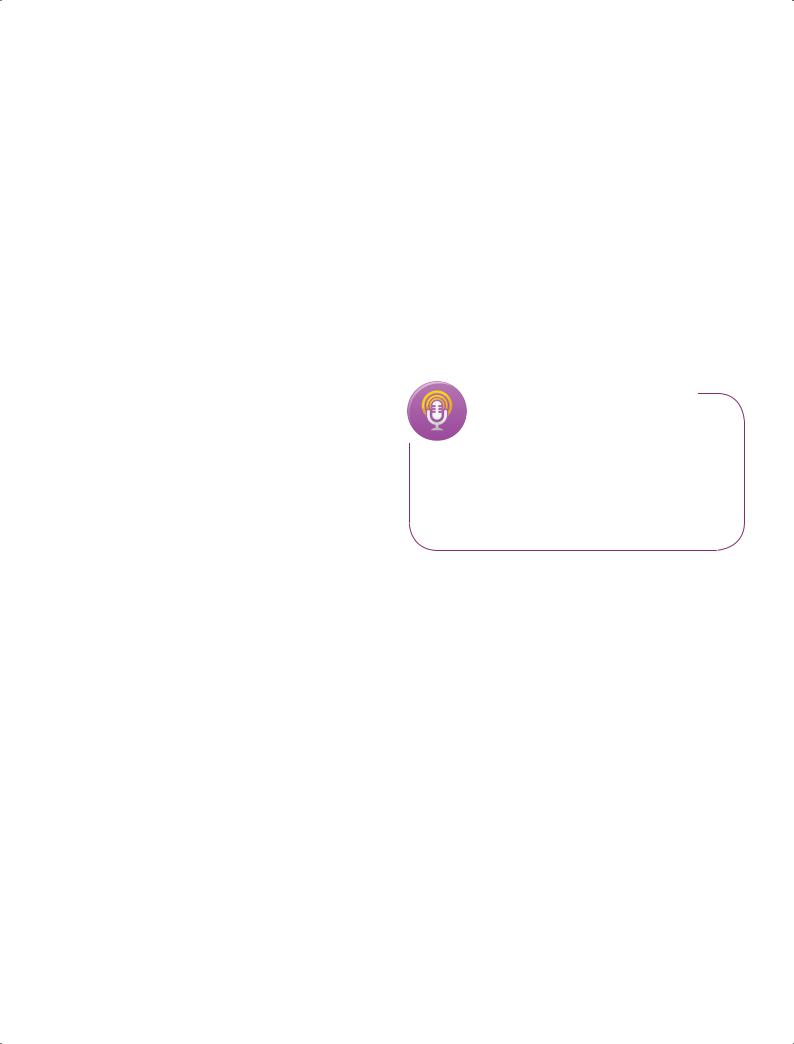
Chapter 14: Applying and Interviewing for Employment |
399 |
(“It’s a pleasure to meet you, Ms. Litton”). Wait until you’re asked to be seated or the interviewer has taken a seat. Let the interviewer start the discussion, and be ready to answer one or two substantial questions right away. The following are some common openers:40
■Why do you want to work here?
■What do you know about us?
■Tell me a little about yourself.
Recognize that you could face substantial questions as soon as your interview starts, so make sure you are prepared and ready to go.
The Question-and-Answer Stage
Questions and answers usually consume the greatest part of the interview. Depending on the type of interview, the interviewer will likely ask about your qualifications, discuss some of the points mentioned in your résumé, and ask about how you have handled particular situations in the past or would handle them in the future. You’ll also be asking questions of your own.
Answering and Asking Questions
Let the interviewer lead the conversation and never answer a question before he or she has finished asking it. Not only is this type of interruption rude, but the last few words of the question might alter how you respond. As much as possible, avoid
one-word yes-or-no answers. Use the opportunity to expand on a positive response or explain a negative response. If you’re asked a difficult question or the offbeat questions that companies such as Zappos and Google are known to use, pause before responding. Think through the implications of the question. For instance, the recruiter may know that you can’t answer a question and only wants to know how you’ll respond under pressure or whether you can construct a logical approach to solving a problem.
Whenever you’re asked if you have any questions, or whenever doing so naturally fits the flow of the conversation, ask a question from the list you’ve prepared. Probe for what the company is looking for in its new employees so that you can
show how you meet the firm’s needs. Also try to zero in on any reservations the interviewer might have about you so that you can dispel them.
Listening to the Interviewer
Paying attention when the interviewer speaks can be as important as giving good answers or asking good questions. Review the tips on listening offered in Chapter 2. The interviewer’s facial expressions, eye movements, gestures, and posture may tell you the real meaning of what is being said. Be especially aware of how your answers are received. Does the interviewer nod in agreement or smile to show approval? If so, you’re making progress. If not, you might want to introduce another topic or modify your approach.
Handling Potentially Discriminatory Questions
A variety of federal, state, and local laws prohibit employment discrimination on the basis of race, ethnicity, gender, age (at least if you’re between 40 and 70), marital status, religion, national origin, or disability. Interview questions designed to elicit information on these topics are potentially illegal.41 Table 14.6 on the next page compares some specific questions that employers are and are not allowed to ask during an employment interview.
If an interviewer asks a potentially unlawful question, consider your options carefully before you respond. You can answer the question as it was asked, you can ask tactfully whether the question might be prohibited, you can simply refuse to answer it, or you can try to answer “the question behind the question.”42 For example, if an interviewer inappropriately asks whether you are married or have strong family ties in the area, he or she might be trying to figure out if you’re willing to travel or relocate—both of which are acceptable questions. Only you can decide which is the right choice based on the situation.
Even if you do answer the question as it was asked, think hard before accepting a job offer from this company if you have alternatives. Was the off-limits question possibly
Listen carefully to questions before you answer.
Paying attention to both verbal and nonverbal messages can help you turn the question-and-answer stage to your advantage.
Federal, state, and local laws prohibit employment discrimination based on a variety of factors, and well-trained interviewers know to avoid questions that could be used to discriminate in the hiring process.
Think about how you might respond if you were asked a potentially unlawful question.
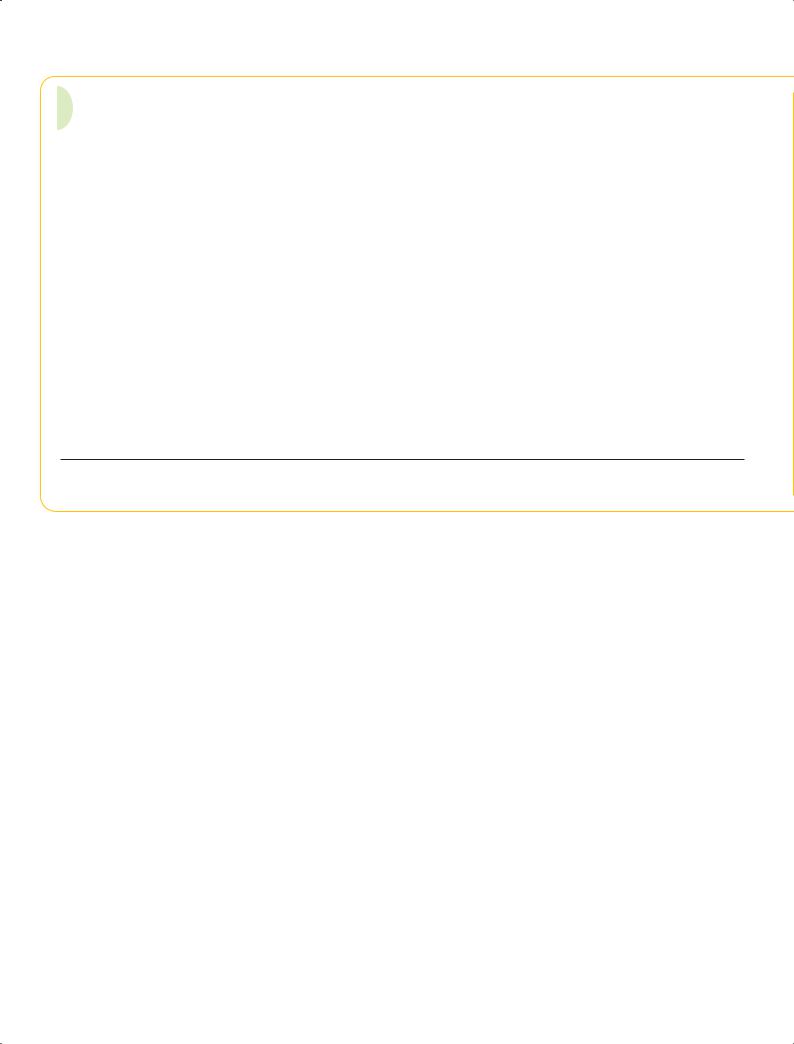
400 Unit 5: Employment Messages and Job Interviews
TABLE 14.6 Acceptable Versus Potentially Discriminatory Interview Questions
Interviewers May Ask This . . . |
But Not This |
|
|
What is your name? |
What was your maiden name? |
|
|
Are you over 18? |
When were you born? |
|
|
Did you graduate from high school? |
When did you graduate from high school? |
|
|
[No questions related to gender are allowed.] |
As a single mom, will you be able to travel for the job? |
|
|
[No questions about race are allowed.] |
What is your race? |
|
|
Can you perform [specific tasks]? |
Do you have physical or mental disabilities? |
|
Do you have a drug or alcohol problem? |
|
Are you taking any prescription drugs? |
|
|
Would you be able to meet the job’s requirement to frequently |
Would working on weekends conflict with your religion? |
work weekends? |
|
|
|
Do you have the legal right to work in the United States? |
What country are you a citizen of? Where were you born? |
|
|
Have you ever been convicted of a felony? |
Have you ever been arrested? |
|
|
This job requires that you speak Spanish. Do you? |
What language did you speak in your home when you were |
|
growing up? |
Source: Adapted from Dave Johnson, “Illegal Job Interview Questions,” CBS Money Watch, 27 February 2012, www.cbsnew.com; “5 Illegal Interview Questions and How to Dodge Them,” Forbes, 20 April 2012, www.forbes.com; Deanna G. Kucler, “Interview Questions: Legal or Illegal?” Workforce Management, accessed 28 September 2005, www.workforce.com.
Conclude an interview with courtesy and enthusiasm.
accidental (it happens) and therefore not really a major concern? If you think it was intentional, would you want to work for an organization that condones illegal or discriminatory questions or that doesn’t train its employees to avoid them?
If you believe an interviewer’s questions to be unreasonable, unrelated to the job, or an attempt to discriminate, you have the option of filing a complaint with the U.S. Equal Employment Opportunity Commission (www.eeoc.gov) or with the agency in your state that regulates fair employment practices.
The Close
Like the warm-up, the end of the interview is more important than its brief duration would indicate. These last few minutes are your final opportunity to emphasize your value to the organization and to correct any misconceptions the interviewer might have. Be aware that many interviewers will ask whether you have any more questions at this point, so save one or two from your list.
Concluding Gracefully
You can usually tell when the interviewer is trying to conclude the session. He or she may ask whether you have any more questions, check the time, summarize the discussion, or simply tell you that the allotted time for the interview is up. When you get the signal, be sure to thank the interviewer for the opportunity and express your interest in the organization. If you can do so comfortably, try to pin down what will happen next, but don’t press for an immediate decision.
If this is your second or third visit to the organization, the interview may end with an offer of employment. If you have other offers or need time to think about this offer, it’s perfectly acceptable to thank the interviewer for the offer and ask for some time to consider it. If no job offer is made, the interview team may not have reached a decision yet, but you may tactfully ask when you can expect to know the decision.

Chapter 14: Applying and Interviewing for Employment |
401 |
Discussing Salary
If you receive an offer during the interview, you’ll naturally want to discuss salary. However, let the interviewer raise the subject. If asked your salary requirements during the interview or on a job application, you can say that your requirements are open or negotiable or that you would expect a competitive compensation package.43
How far you can negotiate depends on several factors, including market demand for your skills, the strength of the job market, the company’s compensation policies, the company’s financial health, and any other job offers you may be considering. Remember that you’re negotiating a business deal, not asking for personal favors, so focus on the unique value you can bring to the job. The more information you have, the stronger your position will be.
If salary isn’t negotiable, look at the overall compensation and benefits package. You may find flexibility in a signing bonus, profit sharing, retirement benefits, health coverage, vacation time, and other valuable elements.44
Research salary ranges in your job, industry, and geographic region before you try to negotiate salary.
Negotiating benefits may be one way to get more value from an employment package.
Interview Notes
Maintain a notebook or simple database with information about each company, interviewers’ answers to your questions, contact information for each interviewer, the status of followup communication, and upcoming interview appointments. Carefully organized notes will help you decide which company is the right fit for you when it comes time to choose from among the job offers you receive.
For the latest information on interviewing strategies, visit http://real-timeupdates.com/ bce6 and click on Chapter 14.
Keeping a careful record of your job interviews is essential.
Following Up After an Interview
Staying in contact with a prospective employer after an interview shows that you really want the job and are determined to get it. Doing so also gives you another chance to demonstrate your communication skills and sense of business etiquette. Following up brings your name to the interviewer’s attention once again and reminds him or her that you’re actively looking and waiting for the decision.
Any time you hear from a company during the application or interview process, be sure to respond quickly. Companies flooded with résumés may move on to another candidate if they don’t hear back from you within 24 hours.45
5 LEARNING OBJECTIVE
Identify the most common employment messages that follow an interview, and explain when you would use each one.
Follow-Up Message
Send a follow-up message within two days of the interview, even if you feel you have little chance of getting the job. These messages are often referred to as “thank-you notes,” but they give you an important opportunity to go beyond merely expressing your appreciation. You can use the message to reinforce the reasons you are a good choice for the position, modify any answers you gave during the interview if you realize you made a mistake or have changed your mind, and respond to any negatives that might have arisen in the interview (see Figure 14.6).46 Email is usually acceptable for follow-up messages, unless the interviewer has asked you to use other media.
A follow-up message after an interview is more than a professional courtesy; it’s another chance to promote yourself to an employer.
Message of Inquiry
If you’re not advised of the interviewer’s decision by the promised date or within two weeks, you might make an inquiry. A message of inquiry (which can be handled by email if the interviewer has given you his or her email address) is particularly appropriate if you’ve received a job offer from a second firm and don’t want to accept it before you have an answer from the first. The following message illustrates the general model for a direct request:
Use the model for a direct request when you write an inquiry about a hiring decision.
When we talked on April 7 about the fashion coordinator position in your Park Avenue showroom, you indicated that a decision would be made by May 1. I am still enthusiastic about the position and eager to know what conclusion you’ve reached.
Identifies the position and introduces the main idea
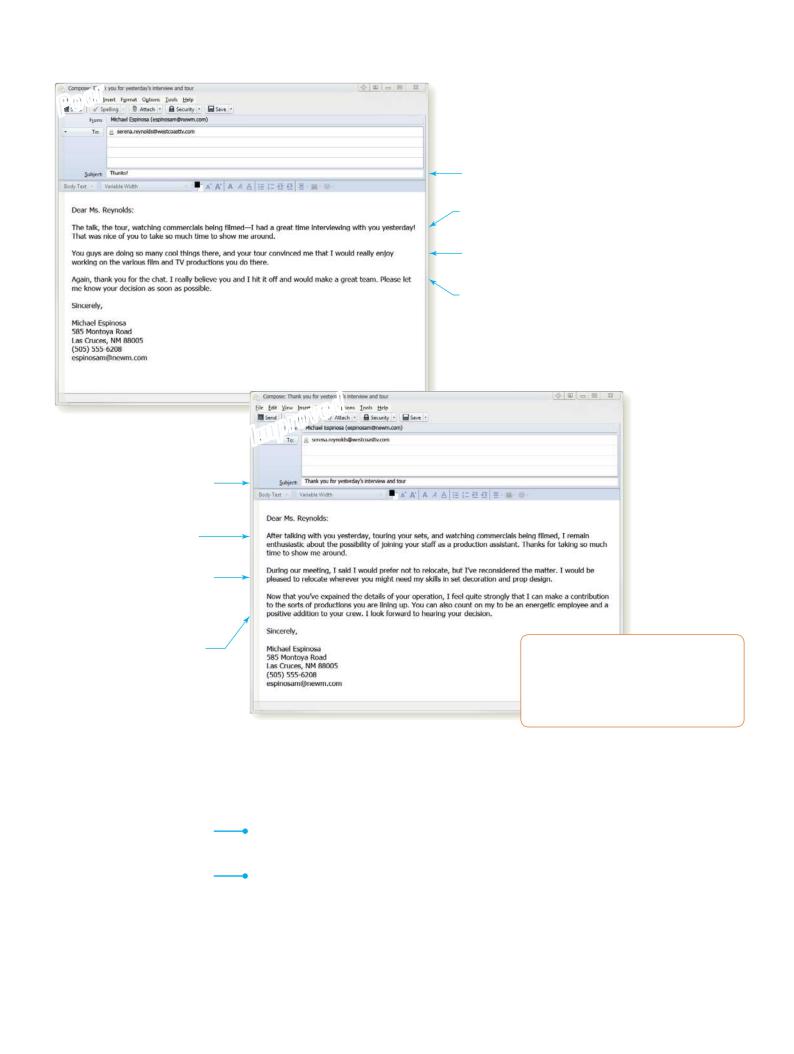
402 Unit 5: Employment Messages and Job Interviews
Poor
The subject line is too generic and doesn’t give the reader any clues about the content of the message.
The message oozes with enthusiasm but beyond that it doesn’t really say
anything to further the candidate’s cause.
The writer fails to use this opportunity to confirm his ability to perform the job.
The tone here is too personal, and the closing line is too demanding.
|
Improved |
|
The subject line lets the reader |
|
|
know what the message is about. |
|
|
The opening expresses |
|
|
appreciation and enthusiasm |
|
|
without overdoing it. |
|
|
The writer takes the opportunity |
|
|
to provide additional information—in |
|
|
this instance, reversing something |
|
|
he said in the interview. |
|
|
Espinosa uses the close to |
MyBCommLab Apply Figure 14.6’s |
|
confirm his ability to do the job |
||
and to emphasize some positive |
key concepts. Go to mybcommlab |
|
personal characteristics. |
||
.com and follow this path: Course |
||
|
||
|
Content Chapter 14 DOCUMENT |
|
|
MAKEOVERS |
Figure 14.6 Follow-Up Message: Poor and Improved
Use the follow-up message after an interview to express continued interest in the opportunity, to correct or expand on any information you provided in the interview, and to thank the interviewer for his or her time.
Source: Used with permission from Microsoft.
Places the reason for the request second
Makes a courteous request for specific action last, while clearly stating a preference for this organization
To complicate matters, another firm has now offered me a position and has asked that I reply within the next two weeks.
Because your company seems to offer a greater challenge, I would appreciate knowing about your decision by Thursday, May 12. If you need more information before then, please let me know.
Request for a Time Extension
If you receive a job offer while other interviews are still pending, you can ask the employer for a time extension. Open with a strong statement of your continued interest in the job, ask for more time to consider the offer, provide specific reasons for the request, and assure the reader that you will respond by a specific date (see Figure 14.7).
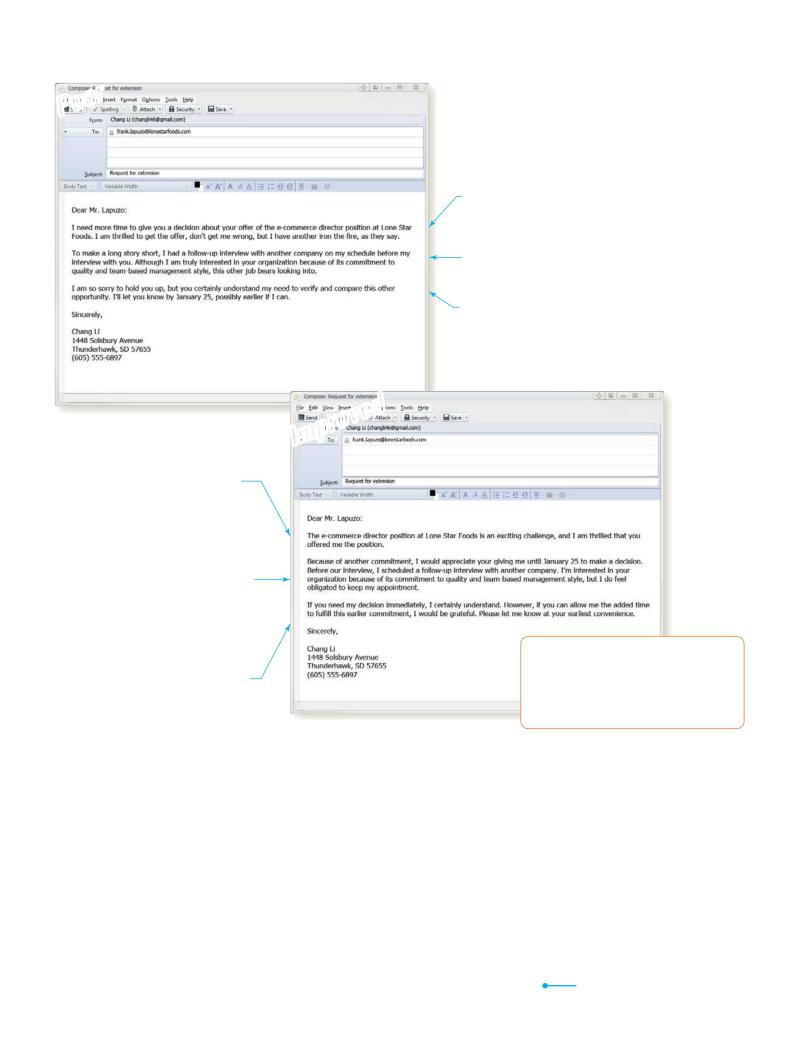
Chapter 14: Applying and Interviewing for Employment |
403 |
Poor
“I need” is a blunt and fairly offensive way to start any message, and particularly so when one is asking the reader to make an accommodation.
“To make a long story short” only makes the story longer, and saying “this other job bears looking into” sounds self-centered.
Apologizing isn’t necessary under the circumstances, but the writer then commits a serious blunder by failing to ask for the extension to January 25.
Improved
This positive opener confirms the writer’s interest in the job and serves as buffer before the upcoming request.
Phrasing this as the need to meet a prior commitment is a graceful way to communicate the idea of wanting to explore the other opportunity, without coming right out and saying so.
The respectful close acknowledges that it might not be possible for
the reader to accommodate the request for an extension. The conditional phrasing (“if you can”) is a good way to make the request
without coming across as demanding.
MyBCommLab Apply Figure 14.7’s key concepts. Go to mybcommlab
.com and follow this path: Course Content Chapter 14 DOCUMENT
MAKEOVERS
Figure 14.7 Request for a Time Extension: Poor and Improved
Needing more time to decide on a job offer is not uncommon, particularly for candidates with desirable credentials. However, make the request in a respectful and subtle way. The reader understands you are comparing opportunities and looking for the best offer, so you don’t need to belabor this point.
Source: Used with permission from Microsoft.
Letter of Acceptance
When you receive a job offer you want to accept, reply within five days. Begin by accepting the position and expressing thanks. Identify the job you’re accepting. In the next paragraph, cover any necessary details. Conclude by saying that you look forward to reporting for work. As always, a positive letter should convey your enthusiasm and eagerness to cooperate:
Use the model for positive messages when you write a letter of acceptance.
I’m delighted to accept the graphic design position in your advertising department at the |
Confirms the specific terms of the |
|
offer with a good-news statement |
||
salary of $2,875 per month. |
||
at the beginning |

404 Unit 5: Employment Messages and Job Interviews
Covers miscellaneous details in the body
Closes with another reference to the good news and a look toward the future
Written acceptance of a job offer can be considered a legally binding contract.
Enclosed are the health insurance forms you asked me to complete and sign. I’ve already given notice to my current employer and will be able to start work on Monday, January 18.
The prospect of joining your firm is exciting. Thank you for giving me this opportunity, and I look forward to making a positive contribution.
Be aware that a job offer and a written acceptance of that offer can constitute a legally binding contract, for both you and the employer. Before you send an acceptance letter, be sure you want the job.
Letter Declining a Job Offer
If you decide to decline a job offer, do so tactfully, using the model for negative messages.
After all your interviews, you may find that you need to write a letter declining a job offer. Use the techniques for negative messages (see Chapter 8): Open warmly, state the reasons for refusing the offer, decline the offer explicitly, and close on a pleasant note that expresses gratitude. By taking the time to write a sincere, tactful letter, you leave the door open for future contact:
Uses a buffer in the opening paragraph
Precedes the bad news with tactfully phrased reasons for the applicant’s  unfavorable decision and leaves the
unfavorable decision and leaves the
door open
Lets the reader down gently with a sincere and cordial ending
Thank you for your hospitality during my interview at your Durham facility last month. I’m flattered that you would offer me the computer analyst position that we talked about.
I was fortunate to receive two job offers during my search. Because my desire to work abroad can more readily be satisfied by another company, I have accepted that job offer.
I deeply appreciate the time you spent talking with me. Thank you again for your consideration and kindness.
Letters of resignation should always be written in a gracious and professional style that avoids criticism of your employer or your colleagues.
Uses an appreciative opening to serve as a buffer
States reasons before the bad news itself, using tactful phrasing to help keep the relationship friendly, should the writer later want letters of recommendation
Discusses necessary details in an extra paragraph
Tempers any disappointment with a cordial close
Letter of Resignation
If you get a job offer while employed, you can maintain good relations with your current employer by writing a thoughtful letter of resignation to your immediate supervisor. Follow the advice for negative messages and make the letter sound positive, regardless of how you feel. Say something favorable about the organization, the people you work with, or what you’ve learned on the job. Then state your intention to leave and give the date of your last day on the job. Be sure you give your current employer at least two weeks’ notice.
My sincere thanks to you and to all the other Emblem Corporation employees for helping me learn so much about serving the public these past two years. You have given me untold help and encouragement.
You may recall that when you first interviewed me, my goal was to become a customer relations supervisor. Because that opportunity has been offered to me by another organization, I am submitting my resignation. I will miss my friends and colleagues at Emblem, but I want to take advantage of this opportunity.
I would like to terminate my work here two weeks from today (June 13) but can arrange to work an additional week if you want me to train a replacement.
My sincere thanks and best wishes to all of you.
